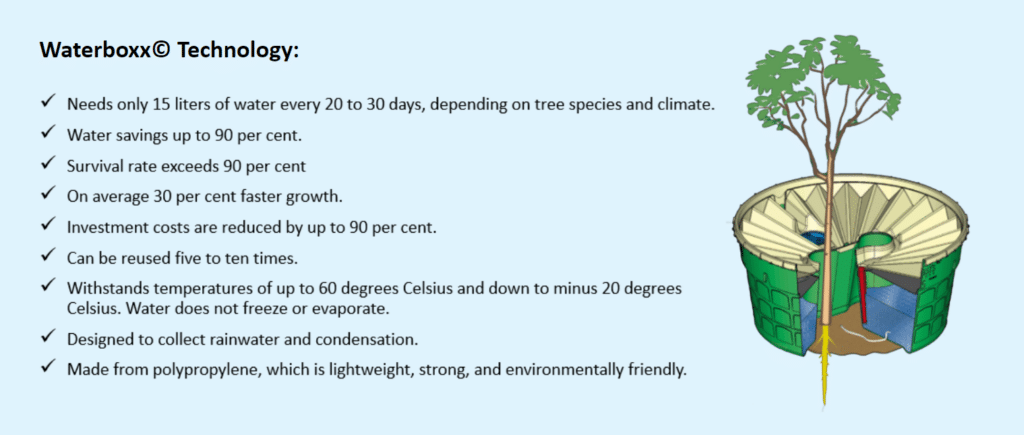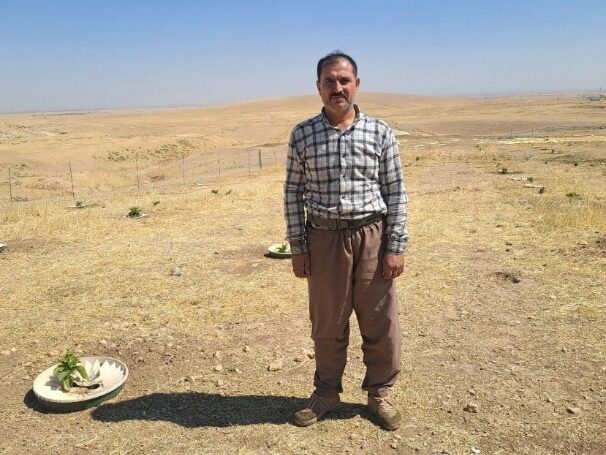Iraq’s urgent need for climate-smart agriculture: how the Waterboxx makes a difference
In Iraq, the challenges posed by climate change are enormous, with temperatures rising seven times faster than the global average. Over the next decade, Iraq is expected to experience significant increases in flooding, drought and desertification. These conditions severely affect livelihoods, undermining household economic resilience and contributing to increased poverty.
- By 2035, Iraq is expected to face a severe water deficit of around ten billion cubic metres, which will have a profound impact on the country’s agriculture and livelihoods.
- Iraq’s water shortage leads to drought and soil salinisation, resulting in the loss of 25,000 hectares of agricultural land each year.
- Already 70 per cent of Iraq’s agricultural land is at risk of total degradation from climate change.
To address these challenges, it is essential to implement climate-smart agricultural approaches that enhance climate resilience and strengthen communities. The Waterboxx is a technology that can contribute to this effort.
The Waterboxx technology
The Waterboxx is an innovative device developed by Groasis to tackle water scarcity and promote sustainable agriculture in arid areas. It is a cylinder-shaped container that collects and stores rainwater for plants and trees. Its design incorporates features that make it particularly useful in difficult climates such as Iraq.
The Waterboxx works by collecting rainwater and dew through its top, which directs the moisture into a central reservoir. The stored water is then slowly released into the ground through a drip system. This provides a steady supply of water for plants and creates a better environment for seeds to grow in.
The need for sustainable water management in Iraq is urgent and this technology can contribute to addressing these challenges in a number of ways:
- Water conservation: By collecting and storing rainwater, the Waterboxx reduces the need for increasingly scarce traditional water sources. This is particularly important in areas of severe drought.
- Soil fertility: The gradual release of water from the Waterboxx helps to keep the soil moist, which is vital for plant health and prevents soil problems such as salinisation.
- Increased agricultural productivity: By providing a reliable source of water, the Waterboxx supports more consistent growth of crops and trees. This can help ensure stable food production and support local livelihoods in areas affected by climate change.
- Ecosystem restoration: By enabling plants to grow, the Waterboxx also contributes to the restoration of degraded land, which can help combat desertification and promote biodiversity.

Supporting marginalised households
Dorcas Iraq is working in Sinjar, Iraq, to support people who are particularly at risk to the effects of climate change. This includes female-headed households, households with people with disabilities or chronic illnesses, and older people without support.
Dorcas Iraq is training nearly 2,500 people in climate-smart agricultural practices and livelihood diversification strategies. Dorcas also provided 50 people with the Waterboxx, tree seedlings and the necessary training to use and maintain the technology. Next year, Dorcas Iraq plans to distribute around 8000 more Waterboxes. This project has already yielded significant positive results, and Dorcas will continue to build on these efforts. One of the project participants who can attest to these positive outcomes is Amin.
Amin is a farmer who has been tending to the fig, olive and grape trees on his ancestral land for a long time. Recently, he began to notice alarming climate changes that threatened his livelihood. Unpredictable rainfall was causing flooding, while extreme summer heat and prolonged drought were threatening his crops. Concerned about the future of the farm, Amin looked for ways to adapt to these new environmental challenges.
Amin came into contact with Dorcas and was introduced to the Waterboxx technology. This was exactly what Amin needed to make his farm sustainable, and after installing the Waterboxes he saw significant improvements in water conservation. He was able to grow crops even in drought conditions. The technology’s ability to collect rainwater and condensation makes it a vital tool for farmers in Sinjar, allowing them to adapt to extreme weather patterns.

Amin’s farm became a model of success and he actively participated in community programmes, sharing his knowledge of sustainable agriculture. His efforts not only ensured the survival of his crops, but also inspired others by demonstrating the impact of innovative technologies.
17 October 2024
Are you inspired?
Read the next story or contact us to get to know more about making an impact together.